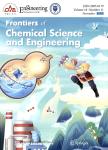Transformer2 proteins protect breast cancer cells from accumulating replication stress by ensuring productive splicing of checkpoint kinase 1
Transformer2 proteins protect breast cancer cells from accumulating replication stress by ensuring productive splicing of checkpoint kinase 1作者机构:Institute of Genetic Medicine Newcastle University Newcastle NE1 3BZ UK Interdisciplinary Computing and Complex BioSystems Research Group and Centre for Bacterial Cell Biology Newcastle University Newcastle NE1 3BZ UK Institute for Cellular Medicine Newcastle University Newcastle NE2 4HH UK
出 版 物:《Frontiers of Chemical Science and Engineering》 (化学科学与工程前沿(英文版))
年 卷 期:2016年第10卷第2期
页 面:186-195页
核心收录:
学科分类:0710[理学-生物学] 07[理学] 071007[理学-遗传学]
基 金:funded by the Breast Cancer Campaign the JGW Patterson Foundation, and the Wellcome Trust
主 题:RNA splicing gene expression breast cancer,DNA damage CHK1
摘 要:Increased expression levels of the RNA splicing regulator Transformer2fl (abbreviated Tra2fl) have been reported in several types of cancer. Recent work has revealed an intimate cross-regulation between Tra2fl and the highly similar Tra2a protein in human breast cancer cells, though these two proteins are encoded by separate genes created by a gene duplication that occurred over 500 million years ago. This cross-regulation involves splicing control of a special class of exons, called poison exons. Down-regulation of Tra2fl reduces splicing inclu- sion of a poison exon in the mRNA encoding Tra2a, thereby up-regulating Tra2a protein expression. This buffers any splicing changes that might be caused by individual depletion of Tra2fl alone. Discovery of this cross-regulation pathway, and its by-pass by joint deple- tion of both human Tra2 proteins, revealed Tra2 proteins are essential for breast cancer cell viability, and led to the identification of important targets for splicing control. These exons include a critical exon within the checkpoint kinase 1 (CHK1) gene that plays a crucial function in the protection of cancer cells from replication stress. Breast cancer cells depleted for Tra2 proteins have reduced CHK1 protein levels and accumulate DNA damage. These data suggest Tra2 proteins and/or their splicing targets as possible cancer drug targets.



